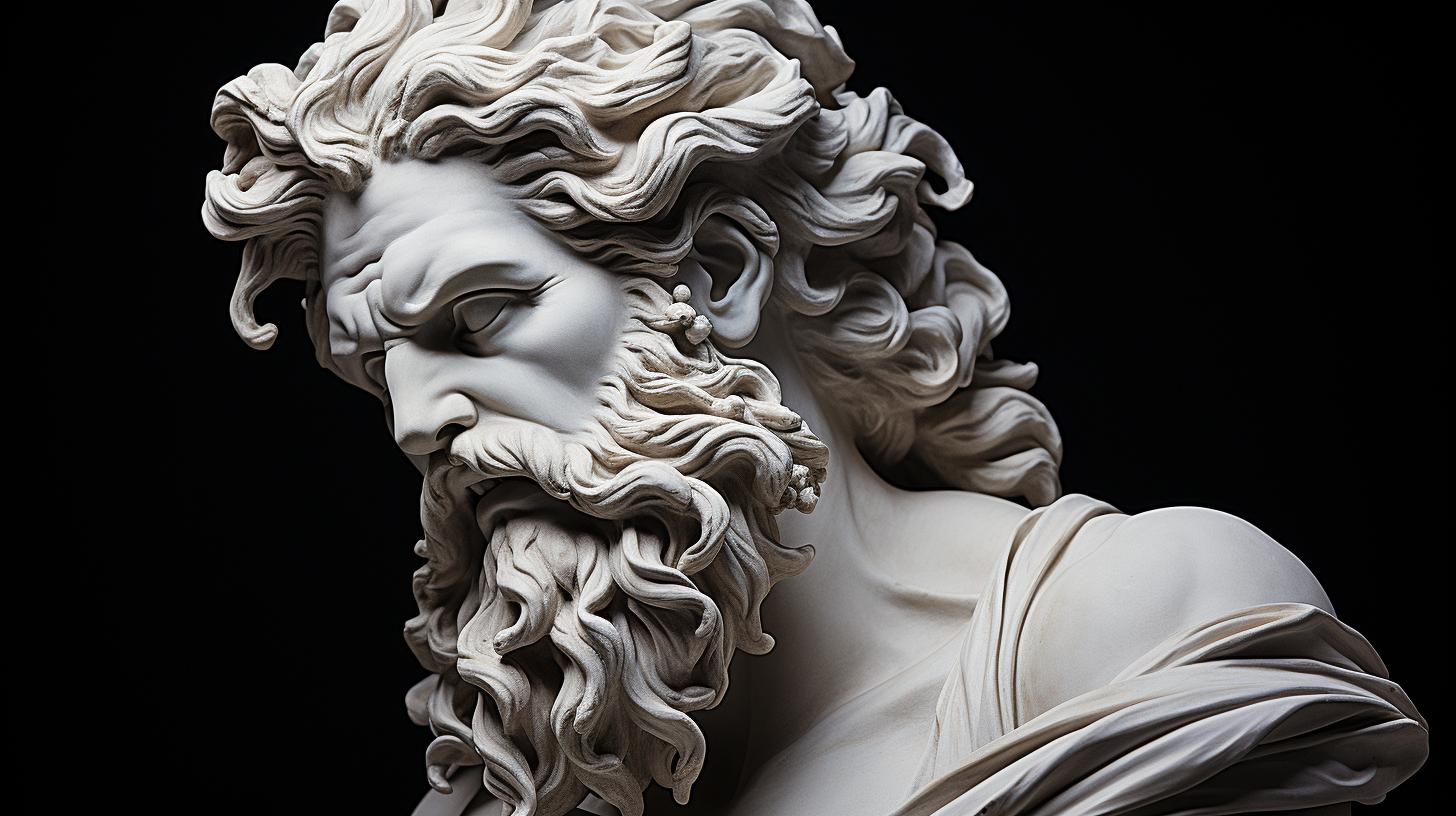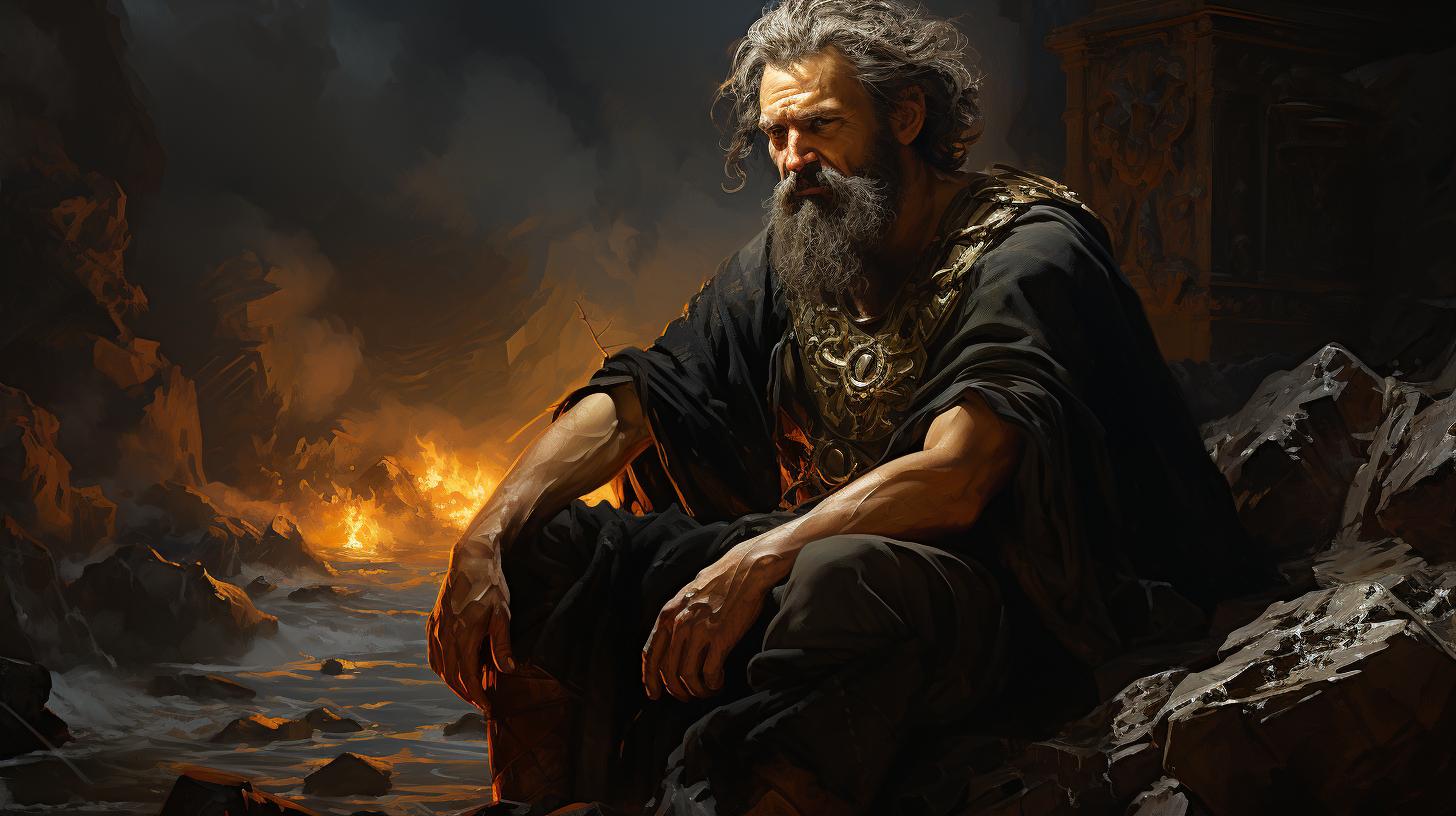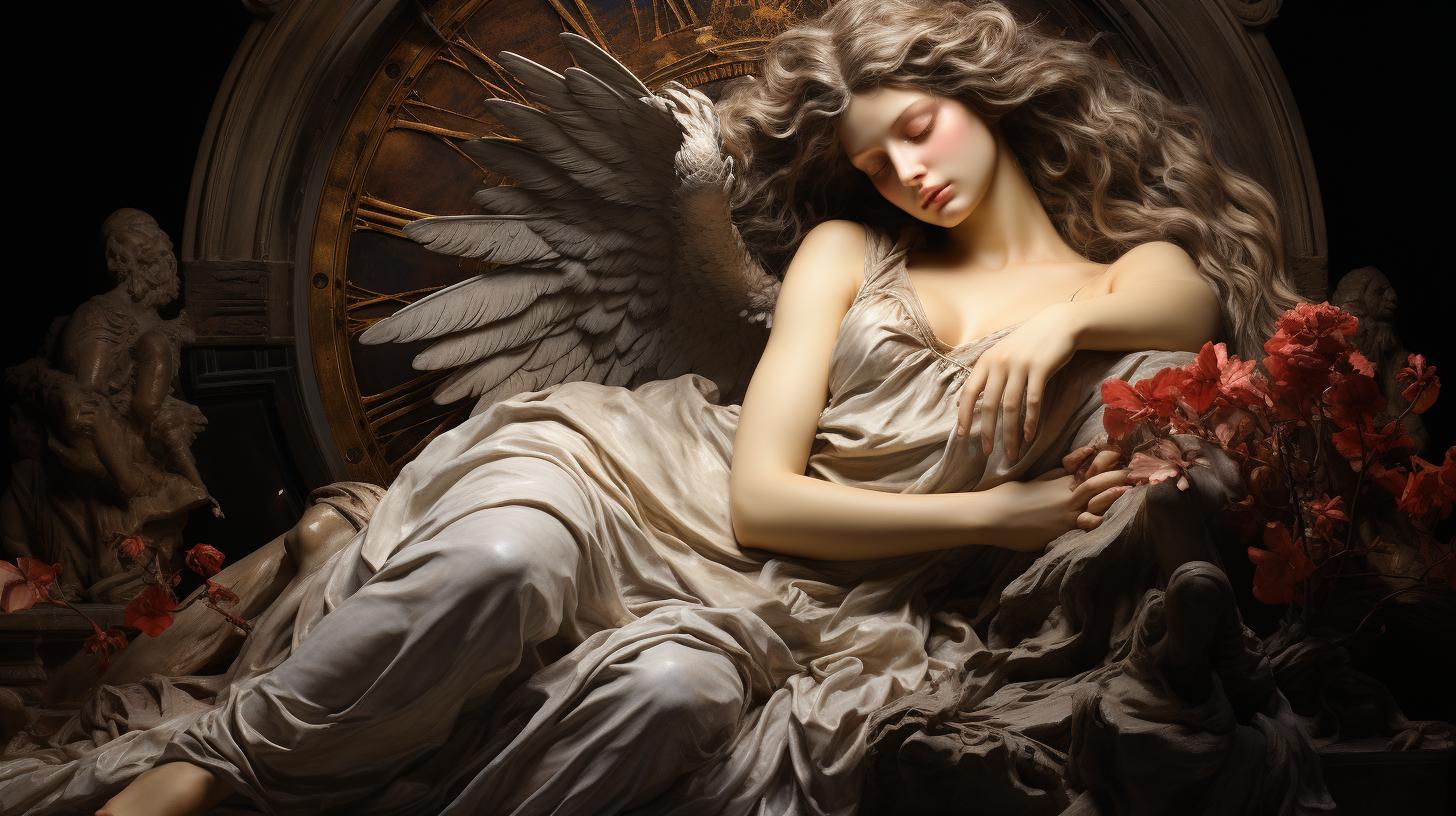Ixion Greek Mythology: A Tragic Tale of Betrayal and Eternal Punishment

The story of Ixion in Greek mythology is one of tragedy and eternal punishment. He was the king of the Lapiths, an ancient tribe in Thessaly. Ixion’s actions, including murder and a lusting for Hera, brought upon him the wrath of both the gods and fellow mortals.
As a result, he was condemned to an eternity of torment, bound to a flaming wheel. This tale serves as a reminder of the importance of justice and respect, as well as a warning against arrogance and misuse of power.
The Story of Ixion: Tragedy and Betrayal
In Greek mythology, the tale of Ixion is one filled with tragedy and betrayal. As the king of the Lapiths, Ixion’s story begins with his relationships and the subsequent consequences that unfold.
His actions ultimately lead to his eternal punishment, serving as a cautionary tale for both mortals and gods alike.
Ixion’s Relationship with Dia and Deioneus
Ixion married Dia, the daughter of Deioneus, but he failed to pay the bride price. In revenge, Deioneus stole some of Ixion’s horses. This act of betrayal sets the stage for the tragic events that follow.
The Violation of Xenia and its Consequences
Ixion’s act of murder, pushing Deioneus into a bed of burning coals, not only showcased his treachery but also violated the sacred concept of xenia, the bond of hospitality and respect between hosts and guests.
This act deeply offends neighboring princes, resulting in their refusal to cleanse Ixion of his guilt and shame.
- Ixion’s Act of Murder and the Offense to Xenia
- The Rejection and Disgrace of Ixion
Ixion’s Fate in the Hands of Zeus
Despite his horrific deeds, Zeus shows him compassion and brings Ixion to Olympus, presenting him as an act of generosity and forgiveness. However, Ixion’s gratitude quickly turns into lust as he becomes infatuated with Hera, Zeus’ wife.
This lustful desire represents yet another violation of the sacred bonds between hosts and guests.
Zeus’ Retribution and the Birth of the Centaurs
Upon discovering Ixion’s intentions, Zeus devises a plan.
He creates a cloud in the likeness of Hera, named Nephele, and deceives Ixion into believing he is engaging in a passionate encounter with her. From this union, an offspring named Imbros or Centauros is born.
Imbros later mates with the horses of Magnesia on Mount Pelion, resulting in the birth of the Centaurs, known as the Ixionidae due to their lineage.
- Zeus’ Deceit with the Nephele Cloud
- The Offspring of Ixion and Nephele
Ixion’s Eternal Punishment
Enraged by Ixion’s actions, Zeus banishes him from Olympus and condemns him to an eternal punishment. He is bound to a fiery wheel, perpetually spinning and engulfed in flames.
Initially, the wheel traverses the skies, but in other versions of the myth, Ixion is transported to Tartarus. Some also suggest that Ixion briefly resides in the realm of Hades when Orpheus, on his journey to rescue Eurídice, plays his lyre.
- Exile from Olympus and the Fiery Wheel
- Other Accounts: Ixion in Tartarus and Hades
Lessons from Ixion’s Story: Justice and Respect in Greek Mythology
The story of Ixion serves as a cautionary tale, highlighting the importance of justice and respect in Greek mythology. By violating the sacred bonds of hospitality, Ixion faces everlasting punishment, emphasizing the consequences of treachery and abuse of power.
Ixion’s Relationship with Dia and Deioneus
Ixion, the king of the Lapiths, had a complex history of relationships, including his marriage to Dia, the daughter of Deioneus. However, their union was not without its complications. It is said that Ixion failed to pay the bride price, causing Deioneus to seek revenge.
In an act of retaliation, Deioneus stole some of Ixion’s prized horses. This act of theft further strained the already tense relationship between Ixion and Deioneus. The conflict between the two escalated, leading to tragic events that would mark Ixion’s life forever.
Despite the issues with Deioneus, Dia remained faithful to her husband. She found herself caught in the midst of this conflict, torn between her loyalty to Ixion and her father’s vengeful actions.
Their relationship faced constant challenges as Ixion tried to navigate the repercussions of his actions and its impact on his marriage.
The dynamics between Ixion, Dia, and Deioneus serve as a reminder of the complexities and consequences that arise from both personal and familial relationships.
In Greek mythology, these relationships were often filled with turmoil and had far-reaching implications.
The Violation of Xenia and its Consequences
The concept of xenia, the sacred bond of hospitality and mutual respect between hosts and guests, held great importance in Ancient Greek society. However, Ixion’s actions irreparably violated this sacred bond, leading to severe consequences.
Ixion’s Act of Murder and the Offense to Xenia
In a deeply disturbing act of betrayal, Ixion plotted and executed the murder of his father-in-law, Deioneus. This act of violence not only disrupted the harmony within familial relationships but also defied the principles of hospitality and respect outlined by xenia.
Ixion’s crime sent shockwaves through the neighboring kingdoms, earning him widespread condemnation and disdain.
The Rejection and Disgrace of Ixion
As news of Ixion’s heinous act spread, the neighboring princes refused to offer him purification, denying him any chances of absolving himself from guilt. Consequently, Ixion was treated as an outcast, shunned and scorned by both mortals and gods alike.
He lived a life of perpetual exile, forever burdened by his unforgivable transgressions against xenia and the sanctity of guest-host relations.
Ixion’s Fate in the Hands of Zeus
Ixion’s actions caught the attention of Zeus, the king of the gods, who decided to intervene in his fate. In a display of compassion, Zeus brought Ixion to Olympus, the realm of the gods, as a gesture of generosity and forgiveness.
This marked a significant turning point for Ixion, as he found himself in the presence of the divine beings he had once offended.
Zeus’ Compassion and Ixion’s Arrival in Olympus
Zeus, having taken pity on Ixion, welcomed him into the company of the gods on Mount Olympus.
This act of kindness was meant to give Ixion an opportunity for redemption and a chance to escape his previous life of exile and rejection. The presence of Ixion in the abode of the gods showcased Zeus’ willingness to forgive and offer a second chance to those who seek it.
Ixion’s Lust for Hera: A Violation of Hospitality
However, instead of expressing gratitude for his newfound place amongst the gods, Ixion succumbed to his lustful desires and developed an infatuation with Hera, Zeus’ wife. This desire for Hera was a grievous transgression against the sacred bonds of hospitality and respect between hosts and guests.
Ixion’s actions not only violated the principles of Xenia but also directly challenged the authority and integrity of Zeus.
Zeus, furious and determined to uphold justice, devised a plan to test Ixion’s intentions.
He created a cloud in the likeness of Hera, known as Nephele, and deceived Ixion into believing he was engaging in a sexual encounter with the queen of the gods.
This illicit union resulted in the birth of Imbros or Centauros, who would later go on to sire the Centaurs, known as the Ixionidae due to their lineage.
Unbeknownst to Ixion, his lustful actions would ultimately seal his fate and contribute to his eternal punishment for violating the sacred laws of hospitality and committing acts of betrayal against the gods.
Zeus’ Retribution and the Birth of the Centaurs
After Ixion’s heinous actions, Zeus could not let him escape without punishment. In his retribution, Zeus devised a cunning plan using the enchanting Nephele cloud, taking the form of Hera, to deceive Ixion.
This deception led to an intimate encounter between Ixion and the cloud, resulting in the birth of an offspring.
Zeus’ Deceit with the Nephele Cloud
Zeus, the master of Olympus, manipulated Ixion’s desires by presenting him with a cloud that resembled his beloved Hera. Unaware of the ruse, Ixion engaged in an illicit encounter with the deceptive cloud, believing it to be the real Hera. Little did he know, his actions had far-reaching consequences.
The Offspring of Ixion and Nephele
From the union of Ixion and the Nephele cloud, a peculiar offspring called Imbros, or the Centaurs, came into existence. These half-human, half-horse creatures played a significant role in later mythological tales.
Imbros himself went on to mate with the mares of Magnesia on Mount Pelion, resulting in the birth of the infamous Centaurs, known as the Ixionidae due to their descent from Ixion.
Ixion’s Eternal Punishment
The story of Ixion takes a dark turn as he faces his eternal punishment for his transgressions. After his misdeeds, Zeus expelled Ixion from Olympus, casting him into exile. Bound to a fiery wheel, Ixion’s punishment was twofold.
Immersed in flames, the wheel ceaselessly rotated, inflicting eternal torment upon him.
Exile from Olympus and the Fiery Wheel
Zeus’s wrath was swift and severe as he banished Ixion from the divine realm of Olympus. Condemned to a life of exile, Ixion found himself trapped in perpetual suffering. Secured to a burning wheel, his agony was intensified as the flames engulfed him, symbolizing his eternal punishment for his heinous crimes.
Other Accounts: Ixion in Tartarus and Hades
Although the prevailing narrative depicts Ixion’s torment on the fiery wheel, other versions of the myth suggest differing fates for the sinful king. Some accounts speak of Ixion’s relocation to the depths of Tartarus, the lowest level of the Underworld, where he endured eternal suffering.
Alternatively, according to certain retellings, Ixion briefly resided in Hades, the realm of the dead, when legendary musician Orpheus played his lyre during his journey to rescue Euridice.
- In Tartarus, Ixion’s torment reached unimaginable depths as he endured eternal pain and remorse for his actions.
- Hades’ brief encounter, facilitated by Orpheus’ enchanting music, shed momentary light on Ixion’s otherwise dark fate.
Thus, Ixion’s eternal punishment serves as a lasting reminder of the consequences that befall those who betray the bonds of hospitality and defy the gods.
Through his torment, we learn the importance of honoring xenia and the dire repercussions that await those who dare to challenge the divine order.
Lessons from Ixion’s Story: Justice and Respect in Greek Mythology
The tale of Ixion in Greek mythology provides valuable lessons about justice and respect.
It serves as a cautionary reminder of the consequences that come with violating the principles of hospitality and betraying the trust of others.
One lesson we can learn from Ixion’s story is the importance of upholding xenia, the ancient Greek concept of hospitality.
Ixion’s act of murdering his father-in-law not only violated the bonds of family but also shattered the sacred relationship between hosts and guests. This egregious offense brought about the rejection and disgrace of Ixion by both gods and mortals, highlights the significance of honoring hospitality and the reciprocal duties it entails.
Another crucial lesson from Ixion’s story is the destructive power of lust and arrogance. Ixion’s audacious attempt to seduce Hera, the wife of Zeus, showcased his disregard for boundaries and his abuse of power.
This violation of hospitality further sealed his fate and led to his eternal punishment.
The story also reminds us of the importance of justice. Ixion’s actions did not go unpunished. Zeus, the divine arbiter, inflicted a fitting retribution on Ixion, exiling him from Olympus and subjecting him to an everlasting torment.
This serves as a reminder that justice will ultimately prevail, even in the realm of gods and mortals.
Ultimately, Ixion’s story serves as a cautionary tale against the consequences of betrayal, arrogance, and abuse of power.
It reminds us of the fundamental values of justice, respect, and the sacred bonds of hospitality that underpin human interaction. By heeding these lessons, we can ensure the harmony and well-being of our societies.
.




















